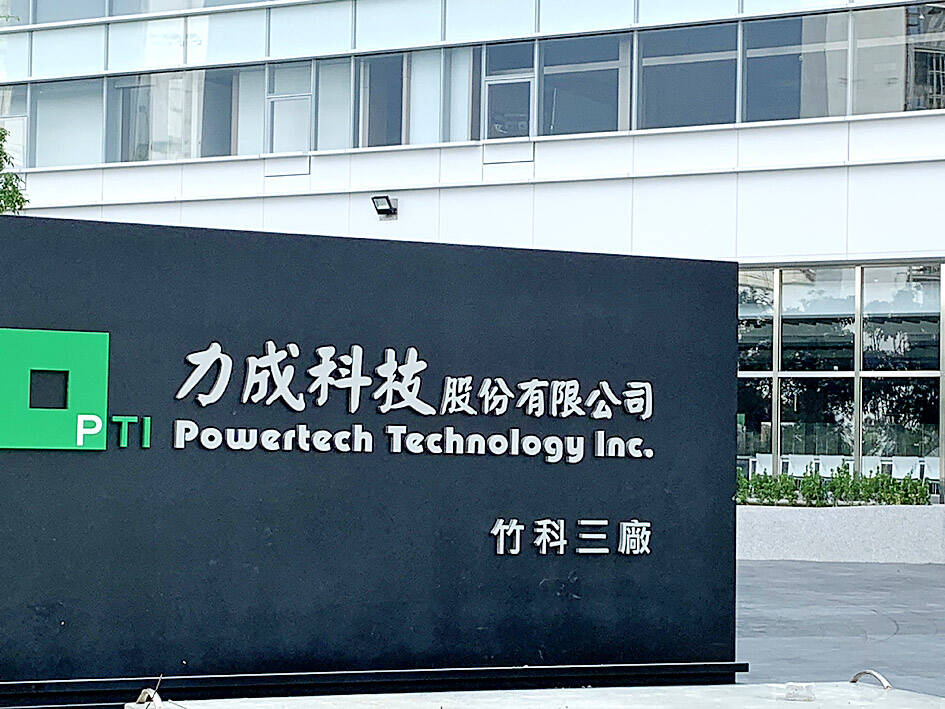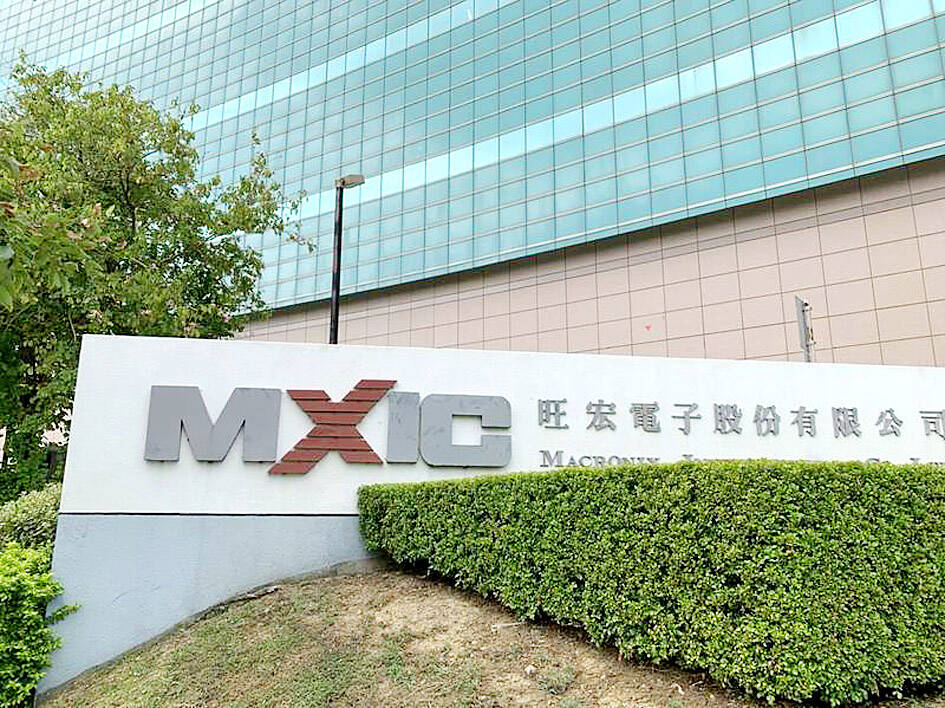Powertech Technology Inc (PTI, 力成), which provides packaging and testing services for memorychip makers, yesterday reported record quarterly profits, bolstered by asset disposal gains and a better product portfolio.
Net profit last quarter more than doubled to NT$3.97 billion (US$127.4 million) from NT$1.57 billion in the third quarter and compared with NT$1.35 billion a year earlier.
Earnings per share (EPS) were NT$5.31 last quarter, up from NT$2.1 the previous quarter and NT$1.81 a year ago.

Photo: Grace Hung, Taipei Times
Non-operating income soared to NT$2.9 billion from NT$574 million in the prior quarter, mainly due to gains of NT$1.43 billion from disposal of a Chinese fab.
For the whole of last year, PTI’s net profit shrank 7.8 percent to NT$8 billion from NT$8.69 billion in 2022, as the semiconductor industry experienced a tough year.
EPS dropped to NT$10.72 from NT$11.6 in 2022 and gross margin fell to 17.9 percent from 20.7 percent the previous year.

Photo: Grace Hung, Taipei Times
The Hsinchu-based company holds a conservative view about prospects in the first half of this year, but expects a robust pickup in the second half, it said.
PTI forecasts a single-digit percentage growth in revenue this quarter on an annual basis, supported by customers’ rush orders, company CEO Boris Hsieh (謝永達) told an investors’ conference.
“The first quarter is usually a slack season for PCs, mobile phones and consumer electronics. Nonetheless, we still received a large volume of rush orders,” Hsieh said. “Nowadays, customers tend to place orders only three months ahead, shrinking from nine to 12 months before, as they do not want to overbuild inventory.”
PTI expects to see “pronounced” growth next quarter, as corporations increase investment in servers, Hsieh said.
During the third and fourth quarters, demand for artificial intelligence (AI)-enabled servers, PCs, mobile phones and other AI-related applications would stimulate the memorychip business, he said.
The company is expected to ramp up advanced packaging for high-bandwidth-memory (HBM) chips in the final quarter of this year at the earliest, Hsieh said.
“We are the world’s only outsourced-semiconductor-assembly-and-test that is capable of providing such advanced packaging service for HBM,” PTI chairman Tsai Du-kung (蔡篤恭) said.
To address rising demand, PTI plans to spend NT$10 billion on capital expansion this year, up about 30 percent from more than NT$7 billion last year.
Separately, Macronix International Co (旺宏), the world’s biggest NOR flash chipmaker, yesterday reported a loss of NT$1 billion for last quarter, the worst in about eight years, compared with NT$408 million the previous quarter.
Gross margin plunged to the lowest level in more than seven years to 19 percent last quarter.
That led the chipmaker to report a loss of NT$1.7 billion last year, reversing a profit of NT$8.97 billion in 2022. That translated into losses per share of NT$0.92 last year, versus earnings per share of NT$4.85 the year before.
Last year, significant inventory impairment and costs for idled capacity added to already sluggish customer demand, Macronix said.
While predicting that the worst has passed, the company said recovery would be fragile this year as auto companies are still grappling with inventory correction.
“The first quarter will not be a good quarter. Demand has yet to take off,” Macronix president C. Y. Lu (盧志遠) told investors. “It all depends on how fast the excess inventory can be digested.”
The inventory of NOR flash memory is the highest among the company’s major products, followed by ROM and then NAND flash memory chips, he said.

Semiconductor business between Taiwan and the US is a “win-win” model for both sides given the high level of complementarity, the government said yesterday responding to tariff threats from US President Donald Trump. Home to the world’s largest contract chipmaker, Taiwan Semiconductor Manufacturing Co (TSMC, 台積電), Taiwan is a key link in the global technology supply chain for companies such as Apple Inc and Nvidia Corp. Trump said on Monday he plans to impose tariffs on imported chips, pharmaceuticals and steel in an effort to get the producers to make them in the US. “Taiwan and the US semiconductor and other technology industries

SMALL AND EFFICIENT: The Chinese AI app’s initial success has spurred worries in the US that its tech giants’ massive AI spending needs re-evaluation, a market strategist said Chinese artificial intelligence (AI) start-up DeepSeek’s (深度求索) eponymous AI assistant rocketed to the top of Apple Inc’s iPhone download charts, stirring doubts in Silicon Valley about the strength of the US’ technological dominance. The app’s underlying AI model is widely seen as competitive with OpenAI and Meta Platforms Inc’s latest. Its claim that it cost much less to train and develop triggered share moves across Asia’s supply chain. Chinese tech firms linked to DeepSeek, such as Iflytek Co (科大訊飛), surged yesterday, while chipmaking tool makers like Advantest Corp slumped on the potential threat to demand for Nvidia Corp’s AI accelerators. US stock

The US Federal Reserve is expected to announce a pause in rate cuts on Wednesday, as policymakers look to continue tackling inflation under close and vocal scrutiny from US President Donald Trump. The Fed cut its key lending rate by a full percentage point in the final four months of last year and indicated it would move more cautiously going forward amid an uptick in inflation away from its long-term target of 2 percent. “I think they will do nothing, and I think they should do nothing,” Federal Reserve Bank of St Louis former president Jim Bullard said. “I think the

‘LASER-FOCUSED’: Trump pledged tariffs on specific sectors, including semiconductors, pharmaceuticals, steel, copper and aluminum, and perhaps even cars US President Donald Trump said he wants to enact across-the-board tariffs that are “much bigger” than 2.5 percent, the latest in a string of signals that he is preparing widespread levies to reshape US supply chains. “I have it in my mind what it’s going to be but I won’t be setting it yet, but it’ll be enough to protect our country,” Trump told reporters on Monday night. Asked about a report that incoming US Secretary of the Treasury Scott Bessent favored starting with a global rate of 2.5 percent, Trump said he did not think Bessent supported that and would not